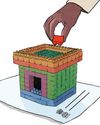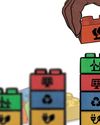
YOU ARE what you eat, or, rather, what you grow to eat. Imagine an entire population eating something that has little food value-something that is devoid of nutrients such as a host of vitamins which are essential for growth, disease prevention and maintaining overall health and well-being. "This is the future we are hurtling towards," says Sovan Debnath, a soil scientist at the Indian Council of Agricultural Research (ICAR) under the Union Ministry of Agriculture and Farmers Welfare.
In November 2023, Debnath and 11 other scientists from ICAR, Bidhan Chandra Krishi Viswavidyalayaanother premier agricultural research institute in West Bengal-and the National Institute of Nutrition in Telangana published a seminal study that says the Green Revolution has helped India achieve food security, but by compromising its nutritional security. In a first, the study reports that breeding programmes focused on developing high-yielding varieties have altered the nutrient profiles of rice and wheat, two major staple food grains of India, to the extent that their dietary significance to the population has diminished. While chasing yield, the plant genetics have been tinkered with so much that they no longer do the fundamental job of delivering nutrition from the soil to the grains.
This story is from the January 16, 2024 edition of Down To Earth.
Start your 7-day Magzter GOLD free trial to access thousands of curated premium stories, and 8,500+ magazines and newspapers.
Already a subscriber ? Sign In
This story is from the January 16, 2024 edition of Down To Earth.
Start your 7-day Magzter GOLD free trial to access thousands of curated premium stories, and 8,500+ magazines and newspapers.
Already a subscriber? Sign In

Look Beyond Dust
Reinvent National Clean Air Programme to focus on fine particulate matter and trans-boundary pollution

PLAN THEM COOL
As urban India turns into a heat trap, the government must focus on improving cities' liveability

Vision 2030
Economic growth must take into account needs of energy transition, climate mitigation, with action aligned as per India's 2030 climate goals

FIX OUR FOOD
Chemical-dependent farming, lax labelling laws, rising anti-microbial resistance must top the agenda

BATTLE THE CAR BULGE
Clean, affordable, integrated and accessible public transport the only solution

CONSERVE NOW
Disregard for biodiversity conservation over the past two decades needs immediate redressal

SCRAP THE DUMP
Disincentivise garbage dumping, invest in behavioural change

THINK LONG-TERM
India needs continued emphasis on flagship programmes, aligned to long-term planning that focusses on water security and circular economy in a climate-risked era

OVERHAUL OVERDUE
Hold polluting industries accountable for public health risks, environmental hazards, climate change; provide them support for green transition

IT'S NOW OR NEVER
Clean energy sectors need demand-driven markets and domestic industries that can cater to the entire value chain